Conrad Weiner has endured more than most of us can imagine. He spent four years of his early childhood in a concentration camp, walked for two weeks in a Ukrainian winter and saw his grandmother and aunt shot to death just for hiding from Nazis. But despite all this hardship, he endures to tell his story with humor and zeal to a new generation of students.
Weiner was the guest speaker at the Jewish Community Relations Council’s annual community-wide Yom HaShoah (Holocaust Remembrance) commemoration, held April 16 at Keneseth Israel Congregation. About 450 people attended the event, including students from several local schools, lighting candles and paying tribute to Holocaust victims.
“I was very pleased with both the quantity of the people there, and the quality of the program,” JCRC Director Matt Goldberg said. “Conrad Weiner is a remarkable individual who has seen the worst of mankind, and yet still thinks positively and is optimistic about the future.”
Rabbi Michael Wolk of Keneseth Israel, the host congregation, introduced the program. “We want to eradicate anti-Semitism in the world,” he said. “We gather to remember those viciously murdered just because they were Jewish.”
The event began with what has become the traditional candle lighting ceremony. Holocaust survivors, the widow of a liberator, descendants of survivors who have passed away and educators who teach the Holocaust lit 11 memorial candles in honor of the 11 million Holocaust victims – 6 million Jews and 5 million others persecuted and murdered by the Nazis. Students from area schools who had studied the Holocaust in a special Anne Frank educational program with the Louisville Orchestra (see story, here) helped with the candle lighting and read the dedications, explaining which groups were remembered with each candle.
Rabbi Stanley Miles of Temple Shalom said, “We are all survivors. We must bear witness and be a coalition of the humane. We must be ever cognizant that it could happen again only with silence.”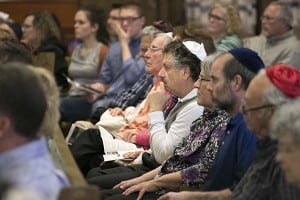
Fred Gross, a local victim of the Holocaust, spoke about the need for remembrance. “We mourn our martyrs and honor our survivors,” Gross said. “Every survivor has an amazing story. If not, there would be no stories. …
“Today, our people are in danger once more. Some believe our only hope is Israel. Not only Israel, but the United States, France, Belgium. Our home is the world. But we need young people to keep our stories alive.”
He noted the difference between what happened during the Holocaust is the existence of the State of Israel as a homeland and refuge for the Jewish people. He encouraged everyone to attend the JCC Yom Ha’atzmaut celebration the following Wednesday.
Adath Jeshurun Rabbi Robert Slosberg introduced Conrad Weiner.
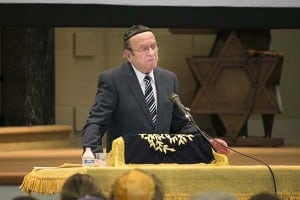 Sharing His Story
Sharing His Story
Conrad Weiner and was just 3-1/2 years old when he and his family were forced to leave their home. He doesn’t remember much, but years later his mother and sister in Cincinnati would sit down on Friday nights after Shabbat dinner and tell him the stories, reminding him repeatedly, “Do not forget.”
While he never forgot, he didn’t share the story publicly until a particular incident illustrated the need. After he retired, he became a substitute teacher because he enjoyed working with youth.
“Young people – you are the last to see a survivor talk,” Weiner said. “I count on you to make a better world for my granddaughters.”
One day at a high school, a student asked if Weiner had lived in Europe during World War II. When he said, yes, the student asked, “Did you meet Hitler?”
Once he was able to gather himself, he joked that he and Hitler didn’t travel in the same social circles.
The teen asked what he did during the war, and Weiner answered, “I spent four years in a concentration camp.”
He responded: “What were you concentrating on?”
He was serious. The boy had no idea what a concentration camp was. “It pains me to tell you that we have not learned from history,” Weiner said to the audience.
It was then that he knew he had to spread the word, and he began telling his story to students at schools all over the Cincinnati area.
Leaving Home
Weiner grew up in Storojinetz, now part of Ukraine, living happily with his family until Hitler came to power. In 1940 and ’41, there were pogroms carried out against the Jews all over Romania. Near his home, a synagogue full of Jews attending Yom Kippur services was locked from the outside and set afire. Three hundred people inside were burned alive.
One day, soldiers came with orders to leave in a hurry and only pack what they could carry. They had to stand outside for a very long time, and Weiner’s grandmother and aunt got tired. They went back inside to rest when the Nazis decided to search the houses for those who tried to hide. The soldiers found the women, thought they were hiding and shot them in front of everyone to make an example of them.
Weiner and the remainder of his family were crowded onto a cattle car with friends and neighbors and taken from their homes. “In a sense, we were lucky to go by train,” he said. “Others were lined up and killed, then thrown into the river.”
When the train stopped several days later, people rushed out of the cattle car, begging for water. Soldiers dumped buckets of water onto the ground, laughing at the people who tried to get what few drops they could from the mud puddles to stay alive.
Those who survived the train ride walked for two weeks to the forced labor camp Budi, in Transnistria, which is between Moldova and Ukraine. Weiner was fortunate to have his uncle with him on the march. That uncle, who had trained in the military and was in good shape, was able to carry him and his young cousin, Kurt Pakur, in turn enabling the children to keep up the grueling pace.
“We arranged to sleep in shifts,” Weiner said. “Some people leaned against trees and froze to death. We saw things that looked like branches, but they were dead people.”
At Budi, they slept in the stalls in the barns. Those who were strong worked cutting timbers for the Nazis. His family found a barrel and made a stove out of it and bartered with a Ukranian woman for food.
Then Weiner became ill. He couldn’t hold any food down, and his mother struggled to get him nutrition. Others in the camp told her, “Don’t torture him – just let him die in peace.”
But his mother, Adela, refused. She climbed a cherry tree to get branches with which to make a tea. Once, she thought she heard someone coming, so she jumped from the tree and injured her leg, which got infected. She had a scar the rest of her life, but thanks to the tea she risked her life to make, Weiner recovered and was able to eat again.
“I remember always being hungry and always being cold,” he said. “I was one of those kids starving in Europe that your parents told you about,” he joked.
Liberation
After the war, the family went back to Romania, which was then a part of the Soviet Union. The family applied to emigrate to the United States but were denied 14 times. Weiner wanted to go to college but was unable to because of Jewish quotas, so he learned a trade and worked in a factory.
The director at the factory was “the nicest man you’d ever want to meet,” Weiner said. One day, Weiner was called into the director’s office, where two men were waiting – one from the Red Army, the other, he later learned, from the Secret Service. The director berated Weiner, calling him a traitor and a disgrace, and said that from now on he is to sweep the factory floor.
Without understanding what was going on or what he had done wrong, Weiner, did as he was told. A few hours later, he was called back into the office, and the director was alone. The man threw his arms around Weiner and said, “You lucky dog! You’re going to the United States!”
“Uncle Sam was good to me,” Weiner said. “He gave me a full year to learn the language before he drafted me into the Army.” The Army soon learned he spoke several languages and decided to take advantage of his skills, sending him to Germany.
“It sounds terrible, but I knew their language, I read their literature,” he said. “I formed some of the longest lasting friendships there.”
He said holding grudges against the Germans isn’t healthy. “Do not hate: If you hate, they win!” he said.
With his GI Bill, Weiner was able to get two degrees, and had two sons who earned degrees and now has two granddaughters he adores. “After 51 years, I have only one wife. You can’t have two of everything,” he joked.
“Let’s celebrate life,” he said, “while we remember those that have passed.”
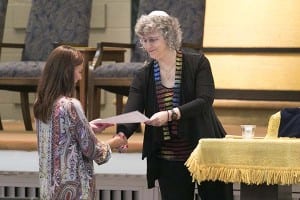 Something Extra
Something Extra
As cherry trees were responsible for Weiner’s survival, on behalf of the JCRC, Rabbi Gaylia Rooks (pictured left) from The Temple presented certificates, each good for one cherry tree, to teachers from local schools who teach the Holocaust and their classes.
Cantor David Lipp from Congregation Adath Jeshurun sang Dremlen Feygl: Dreaming Birds by L. Durnitski, Cantor Sharon Hordes from Keneseth Israel Congregation sang the memorial prayer Eil Malei Rachamim, and Rabbi Joshua Golding of Congregation Anshei Sfard introduced Holocaust survivor John Rothschild, who led the mourner’s Kaddish.
Matthew and Kathy Karr performed flute and bassoon duets during the program.
Members of the Yom HaShoah Committee were Dan Streit, Cantor David Lipp, Rabbi Michael Wolk, Jeff Slyn, Fred Gross, Fred Whittaker, Jeffrey Jamner, Shannon Kederis, Thelma Marx, Jeff Barr. Becky Swansburg is the JCRC chair and Matt Goldberg is the JCRC director.



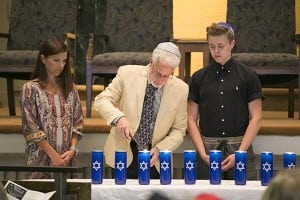
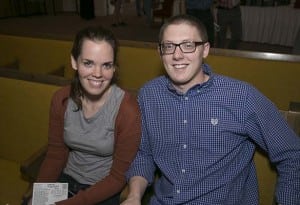

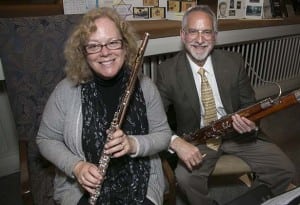
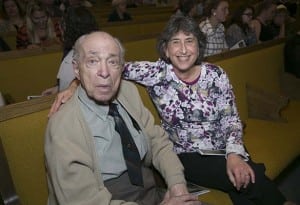
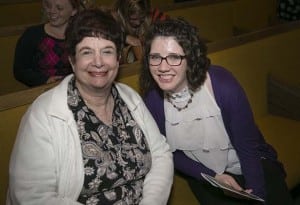
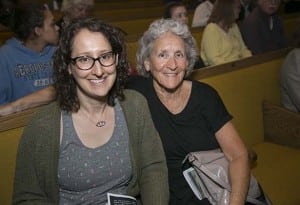
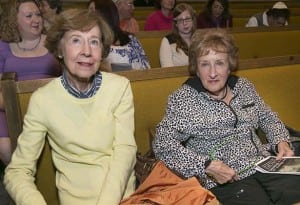
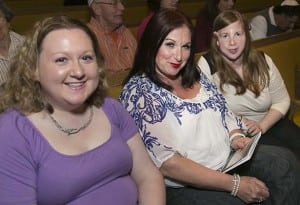
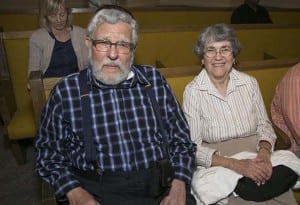
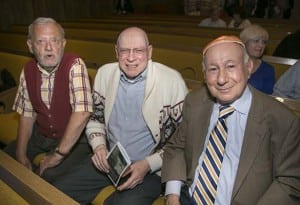
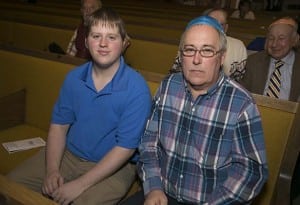

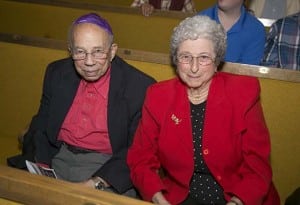
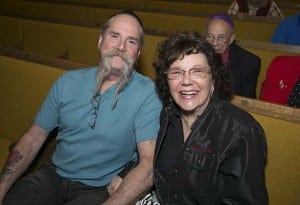
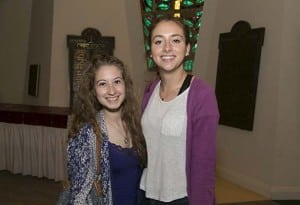
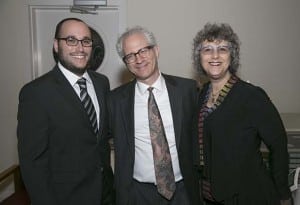
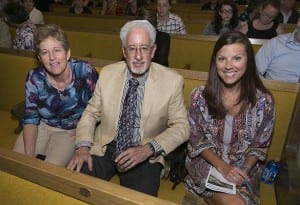
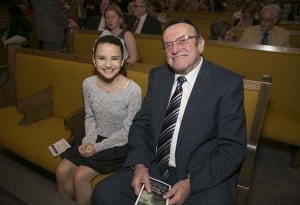
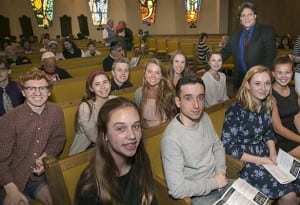
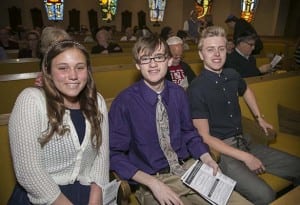
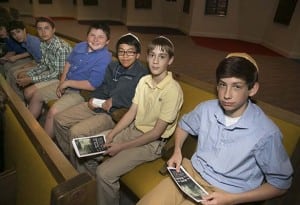
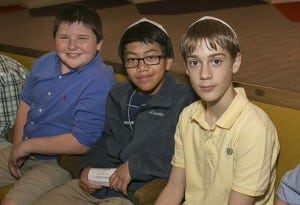
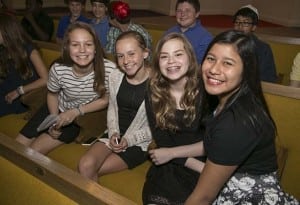
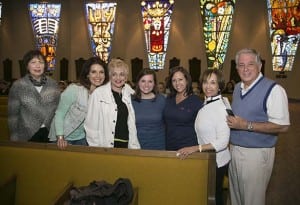
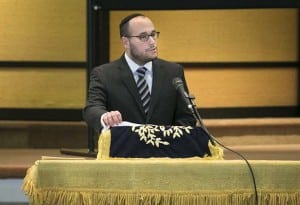
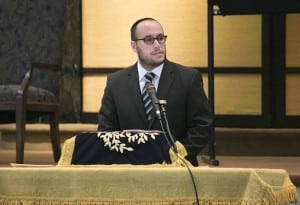
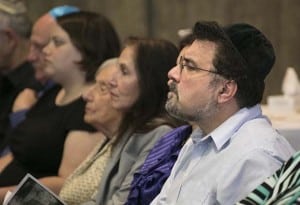
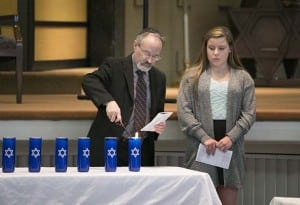
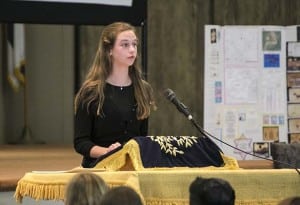
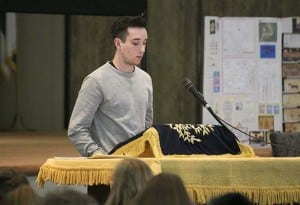
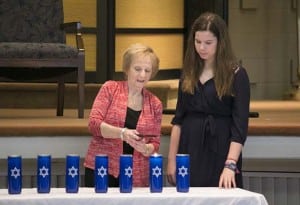
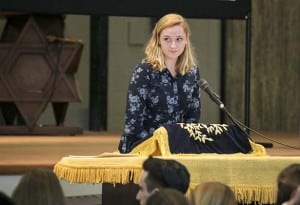
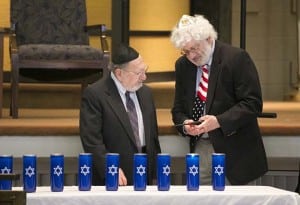
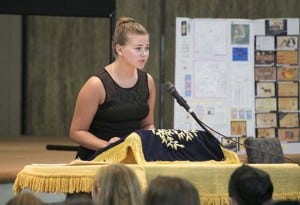
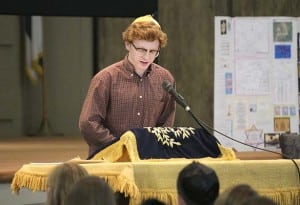
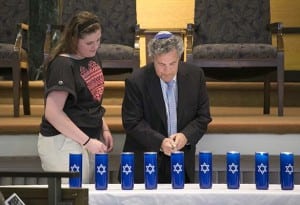
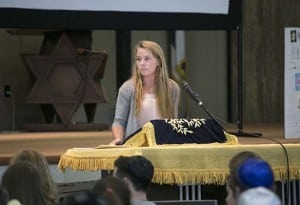

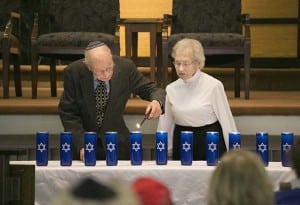

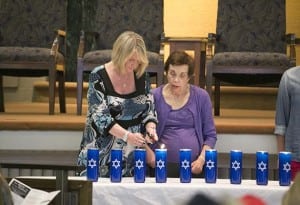
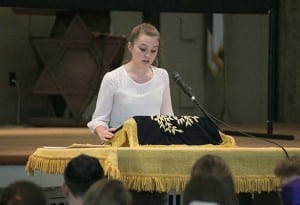
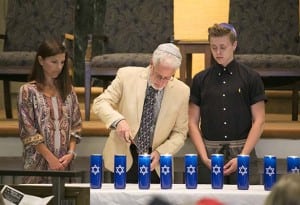
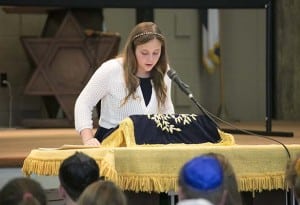
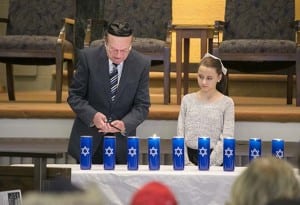
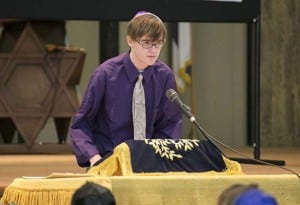
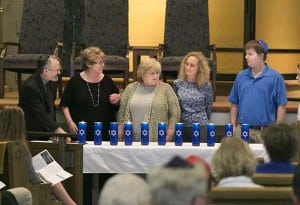
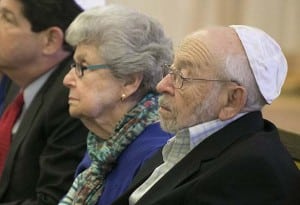
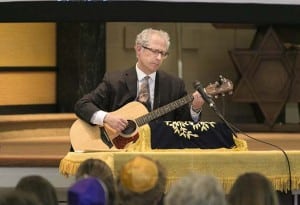
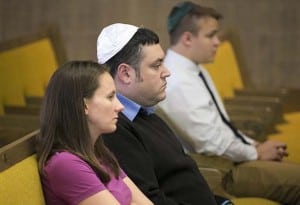
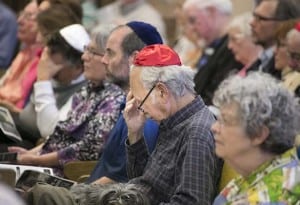
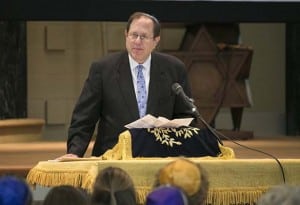
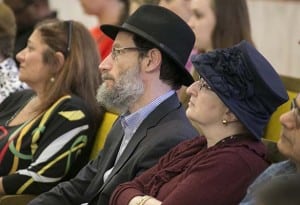
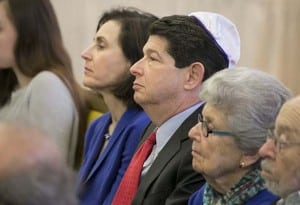
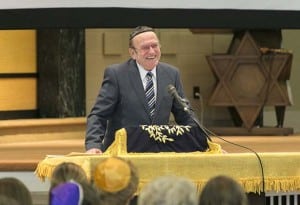
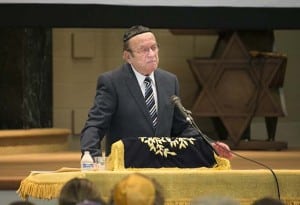
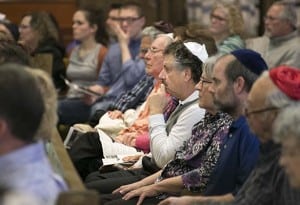
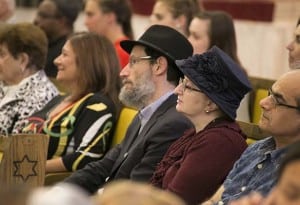
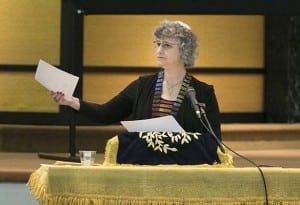
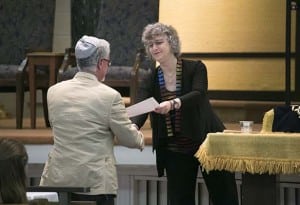
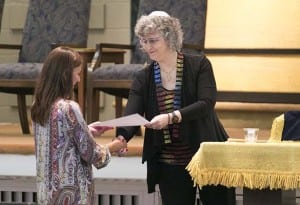
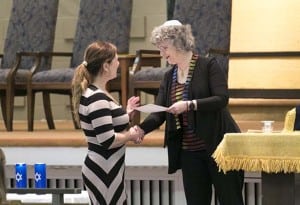
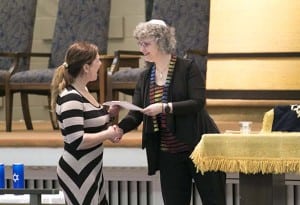
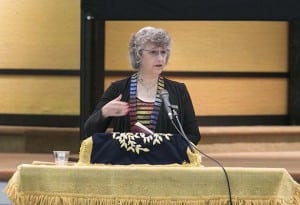
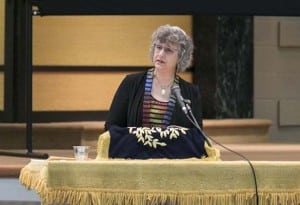
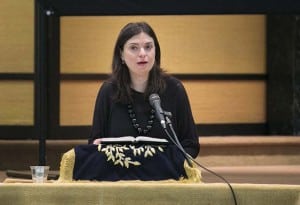
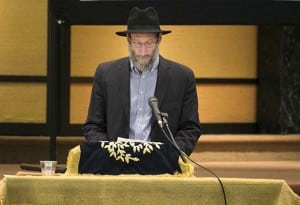
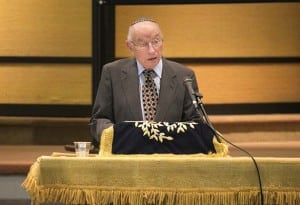
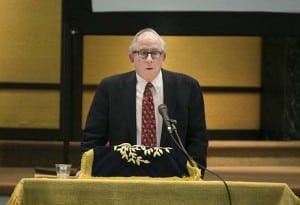
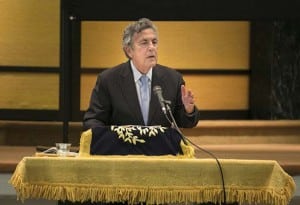
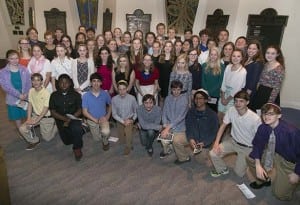

Awesome life story. My Great Uncle Joseph Sohn Bettleheim told me his story. He said, when I was 5 years old and walking to his Grocery Store with him, “Jimmy, let me tell you ’bout ‘de ‘ole country…Hungary. It was before Buda and Pest were united to form the capital.” I became our Family Genealogist/Historian and constructed our Family Tree. I desire to write Children’s Books now that my first Grand Daughter is to be born in January 2017.